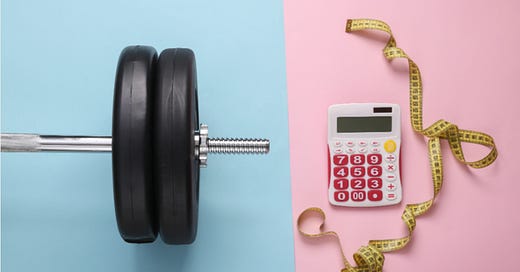Collective culture often quantifies things, because putting a numerical value on something makes life a bit simpler. Measuring steps, tracking protein intake and getting in a certain amount of reps per muscle group when strength training are all important elements to be aware of. They’re ideal benchmarks for living a healthy and fit lifestyle.
However, a data driven lifestyle needs to counterbalance itself with a fine degree of nuance, and an acknowledgement that things don’t always go to plan. Honing in on the end result without being flexible about the process to get there, is a slippery slope. Reflecting on how we feel (in the moment and afterwards) and listening to our minds and bodies might actually be a better way to determine the quality of our wellness plan. That’s certainly the impression I’ve gleaned from my own experience.
I love working out, and training is a vital part of my lifestyle. But the healthiest thing for me is being able to step back or revise my routine when I’m going too hard or doing too much.
I started exercising because I was triggered by intrusive thoughts about maintaining my longevity. At first I was riding the endorphin wave, and feeling on top of the world. Unfortunately, the OCD that spurred my fitness journey soon took the reins, and working out was becoming akin to a chore. “I have to do my fitness” was a common refrain. I definitely would have burned myself out if I kept adhering to that mindset.
What’s working for me is approaching exercise through a critical and conscious lens. I started to brush up on the field of exercise science, while also focusing on treating my mental health as intently as I was dealing with my physical well-being. Finding the equilibrium between my mind and body is the overall goal, which motivates my training routine.
While maintaining a very active routine, I’m also allowing myself to rest more. I also no longer have qualms about cutting a session short, or doing less reps than I would normally do for one reason or another. OCD makes it hard to adhere to the fact that not everyday is going to amount to the same good result, it ebbs and flows. But for a true longevity minded lifestyle, I’m understanding the importance of not letting exercise become an obsession, or be stimulated by intrusive thoughts.
I’m aware, but not fixating on the quantitative benchmarks of fitness and exercise. Paying too much attention to those facets can be triggering for my mental health. I know that I can maintain a fit lifestyle, and make significant strides with my physical training through an equilibrium of logic and intuition.
Since I was a theater kid, and still enjoy a good musical number (especially an ensemble piece); I’m ending this piece with a question in the form of a song. If you’re also a theater buff, you should recognize the tune I’ve appropriated.
In breathwork, in laughter
In sleep hygiene, in grams of protein
In steps, in miles
In diet, in cups of water
How do you measure wellness in your life?
Thanks for reading Artfully Exercising!
Show me some ❤️
I’d be grateful if you’d take a moment to hit the “heart icon” on this post to show your appreciation (and boost this post within the algorithmic sea that is social media).
Consider subscribing 📩
Artfully Exercising is a reader-supported publication about art and fitness. To receive new posts and support my work, consider becoming a free or paid subscriber:
Documenting my physical and mental health journey in the form of Artfully Exercising has been a labor of love, which takes a lot of (well spent) time, energy and resources to write the content you receive in your email boxes. If my writing has given you any sort of inspiration and enrichment, please consider making a contribution by becoming a paid subscriber or making a one time contribution.
If you are not ready to become a paid subscriber, you can support my work with a one pledge at a monetary value of your choice:
Let’s continue the conversation 💬
If what I’ve written resonates with you, and/or you want to share your thoughts, please leave me a comment! One of the most rewarding things about writing is getting feedback and making connections with others!





We can just objective feedback to help facilitate direction of goals for improvement but subjective satisfaction > objective adherence in almost every situation.
It sounds like you’re finding some balance.
I have to be careful to avoid sore joints if I don’t leave enough recovery time for my elbows and shoulders. So I’ve given myself permission to alternate workouts more and add a rest day mid- week as well as switching things up on the weekend. My mind and souls won’t burn out, but my elbows and left hip will!